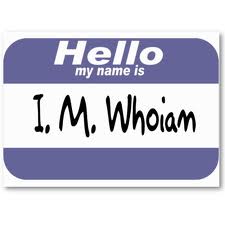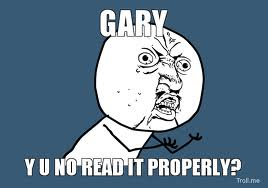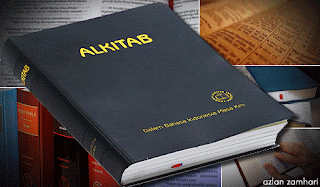The Church & Allah

KTemoc Konsiders
I’m not surprised by the adverse feedback I’ve received regarding my post Now, who are the Arab wannabes? here as well as at Malaysia-Today, because firstly, it’s an issue related to religions and secondly, I have the seeming effrontery to side with UMNO (and PAS).
I am again not surprised that many have missed the point, evidenced by remarks like:
(a) So, based on this simple etymological track, the used of ANY word/name to describe a Superbeing that the follower used was/is Highly localised. It should not be monopolised, just like some local Muslims like to dictate!
(b) Will you be happy if I forbid you from using certain words because I find it offensive? Who am I to impose this on you? If I forbid you to call your wife, your brother or sister with an alternative name because I find it offensive with their current names which you been calling them all these years. Will you be glad? Please think through.
None of above had been what I proposed in my previous post on subject matter.
|
wakakaka |
Just to refresh your memories (and a bloody lack of reading skills, wakakaka) I wrote:
While I believe on principle there ought not to be a monopolistic use of any word or words, I can understand the Muslim community’s worries about the Church’s obdurate intention to use this word, especially more so when I know it’s obligatory, nay, a sacred duty of the Church and Christians to be ‘missionary’ (evangelistic).
Yes, I’m afraid on a personal basis, kaytee isn’t all that supportive of the Church’s insistence on using the Allah word to represent/indicate/describe their Christian God in the Malay language.
Given the experts’ etymological and historical clarifications on the Allah word, I am in no doubt that Father Lawrence Andrew is on strong legal grounds to use it … and indeed we know that the court has supported his stand.
But I have always believed that religion is about faith and morality and not legality or for that matter, political approval. Thus I find it unfortunate that the Father Andrew and the Catholic Herald had taken the issue to the courts. Surely on a matter of religious faith and knowledge, there are numerous other names of God it could have use beside Allah. I view its arguments for the use of Allah as seemingly based on obduracy and legality rather than any plausible unavoidable reason.
The reason why I have not (still am not) been sympathetic with the Church, I had already expressed as follows:
let us also not forget that Christianity and indeed Islam as well are both evangelistic missionary religions with an obligation on the faithful to convert the so-called pagans, for altruistic reasons of course.
So, what is the meaning of ‘missionary’ and ‘evangelistic’?
In their adjectival forms, the dictionary has these to say, respectively:
Missionary = reflecting or prompted by the desire to persuade or convert others.
Evangelistic seeking to evangelize; striving to convert sinners (where sinners mean all not within the Faith).
Dictionary also defines the word evangelize as ‘to convert to Christianity’, and where we can also substitute the word Christianity with Islam.
Thus, both Christianity and Islam require their respective followers to evangelize.
In my post I had written:
I dare say those Dutch Christian missionaries were out to convert the Indonesian pagans (Muslim and others) into Christianity with whatever it took, and would have found the use of the word Allah as a convenient substitute for the Christian God in persuading the native Muslims that the conversion to Christianity would be nothing more than a seamless worship to the same Allah, albeit with some minor adjustments to the rituals.
Thus the argument that the 16th Century Dutch had been doing this or that during dictatorial colonial circumstances would today be just not good enough for the Church to persist along that line.
|
Dutch church in Indonesia |
Leaving aside the legal aspect, where I had already accepted that Father Lawrence Andrew is on very strong grounds, my post points out the several areas and factors where I have found the stand of the local Catholic Church and Father Lawrence Andrew quite disturbing.
Thus I asked and continue to ask again:
Really, I have to ask again of Father Lawrence Andrew and the Church: “What is really your goal in obdurately pursuing the use of the word Allah to refer to the Christian God in a Malay-language newsletter and Bible when so many other names of your Christian God, with even better biblical pedigree, remain available?”
If the aim of the Church is to spread the word of God, why not use Tuhan or Elohim or a multitude of other Hebraic names available from its source, the Tanakh. Why insist on the Allah word when everyone in Malaysia, especially Peninsula Malaysia knows that Allah is familiarly (automatically) visualized and known as the God of Islam.
Thus I quoted Friedrich Nietzsche who reminded us: “Many are stubborn in pursuit of the path they have chosen, few in pursuit of the goal.”
Isn’t the goal of the Church to spread the word of its Christian God, which can be done without using the word Allah because Elohim and Yahweh and Tuhan are available?
Why has the Church represented by the person of Father Lawrence Andrew remain stubborn in pursuit of the path they have chosen, namely, to use the Allah word in their Catholic Newsletter, the Herald, and the Bahasa version of the Bible, al Kitab?
Without too much hubris I believe I have successfully challenged every position Father Andrew and the Church had presented as to why the Allah word is essential and cannot be substituted, but some comments here as well as at RPK’s Malaysia-Today have totally ignored my points, and continue to come up with comments equally as obdurate as Father Andrew’s or as if they haven’t read my post at all (which has been why I mentioned some readers’ ‘lack of reading skills’ wakakaka).
In other words, my post questions the sincerity of the Church’s insistence in using the Allah word, which I do not support because of the likelihood of confusion over whose (Islamic or Christian) god is Allah.
The ensuing confusion would not be unlike a dangerous sampan in a very turbulent evangelistic sea.
Now, my dear friend Ong Kian Ming wrote a piece in Malaysiakini titled Allah row – what’s the name of the game?
Much as I (platonically, wakakaka) love Kian Ming (and I am not joking, he’s a great guy) I am not persuaded by his article.
He argued that as Yahwah is already translated into Tuhan, then Elohim (if also translated into Tuhan) following the Yahweh word would result in Tuhan … Tuhan, giving us a double or repetitive Tuhan which won’t make sense or provide cohesive reading for the mentioned passage.
|
MKINI photo |
He provided the example of Exodus 29:46, which (KJV) states:
And they shall know that I am the LORD their God, that brought them forth out of the land of Egypt, that I may dwell among them: I am the LORD their God.
Kian Ming provided the NIV (1984) version which doesn’t make much difference to KJV for his arguments and the point I intend to make. But let’s use his NIV 1984 version which states:
They will know that I am the LORD their God, who brought them out of Egypt so that I might dwell among them. I am the LORD their God.
He argued that a Bahasa translation minus the use of the Allah word would give us:
“Mereka akan tahu bahawa Akulah TUHAN, Tuhan (rather than Allah) mereka yang telah membawa mereka kelaur dari Mesir, supaya Aku dapat tingal bersama-sama mereka. Akulah TUHAN Tuhan mereka.”
But in that translation, Kian Ming has become just like Father Lawrence – though as his matey, I believe Kian Ming has been sincere – in believing that both Yahweh and Elohim must both be translated into Tuhan.
Why, and what for? Unless you insist on making an disingenuous point?
Thus, according to his arguments, if we are to avoid the awkward Tuhan Tuhan translation, we require both the Tuhan and Allah words, so as to show each as a different word in that passage.
But my point is why must Elohim be translated from Hebrew into Arabic (Allah)? Why not retain the Elohim word as is in al Kitab instead of translating into Arabic and then daringly claim Allah is a Malay word. If one can claim the Arabic Allah is a Malay word, why not claim and use the Hebraic Yahweh and/or Elohim as also Malay words.
Thus the Bahasa translation of Exodus 29:46 should read as follows (two forms):
(a) “Mereka akan tahu bahawa Akulah TUHAN, Elohim mereka yang telah membawa mereka kelaur dari Mesir, supaya Aku dapat tinggal bersama-sama mereka. Akulah TUHAN Elohim mereka”
or
(b) “Mereka akan tahu bahawa Akulah Yahweh, Tuhan mereka yang telah membawa mereka kelaur dari Mesir, supaya Aku dapat tingal bersama-sama mereka. Akulah Yahweh Tuhan mereka”
I personally prefer the second. And don’t forget, we also have Adonai, El Elyon, El Shddai, El Olam, etc.
Sorry, Kian Ming, as a matey I regret I can’t even say ‘good try’ because your arguments have been based on the totally incorrect premise that the Allah word is a Bahasa word when it’s patently not – it is as Middle-Eastern (Arabic) as much as are Yahweh and Elohim (Hebrew).
Now, what about my idol Karpal Singh’s comments in Malaysiakini’s that Karpal rises to Guan Eng’s defence over ‘Allah’ row which reported:
DAP national chairperson Karpal Singh has risen to the defence of the party’s secretary-general Lim Guan Eng’s Christmas day call for Christians to be allowed to use the term ‘Allah’, stating that it was not intended to hurt Muslim sensitivities.
He explained that Lim’s call was meant for Christians in Sabah and Sarawak where the word has been in use for generations.
I think that’s fair enough, though if we have already published a Malay edition of the al Kitab which uses Elohim instead of Allah, why not use it to acquaint Sabahan and Sarawakian Christians on the Elohim and/or Yahweh word(s). Why have a further division of Peninsula from the Eastern States even in al Kitab?
It is surprising, therefore, that Penang Umno secretary Azhar Ibrahim has publicly come out with a scathing attack on the Penang chief minister that what he had said in his Christmas message should not hurt the feelings of Muslims, he said in a statement yesterday.











